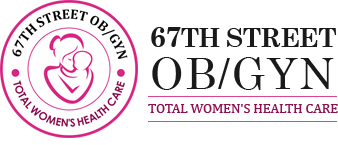The first obstetrician visit is one of the most exciting and nerve-racking experience for most women. At this point, you most likely have come to terms with the fact that you are really pregnant. If you have a doctor who specializes in gynecology alone, he/she would most likely refer you to an Obstetrician or OB/GYN (a doctor that specializes in both gynecology and obstetrics). This is because a gynecologist provides health care for all female health issues; while an Obstetrician is responsible for the pre-conception, pregnancy, childbirth, and the immediate after childbirth care of a mother.
Be sure to ask your health provider; if he/she is a gynecologist or OB/GYN before scheduling an appointment. If you would like more information; contact us at 67th Street OB/GYN- Total Women’s Health Care; and we will schedule an appointment for you to meet with one of our Obstetricians in Manhattan. Once you have made certain that your doctor is either an OB/GYN or scheduled an appointment with an obstetrician, then you can proceed to your first visit.
What happens on your first obstetrician visit?
During your first obstetrician visit once you find that you are pregnant, you should expect to be asked an extensive amount of questions, especially if it’s your first time seeing your doctor (this includes those that are visiting an OB/GYN for the first time or switching from a gynecologist to an Obstetrician). Hence, you should have your entire medical record during this visit. It should also include diaries containing dates of your menstrual cycles if you have one, allergies, your family’s medical history, hospitalization records, examinations, and results. Your doctor would also want to know of any pre-existing conditions not stated in your medical record and medications you are on.
As a lot of medications are harmful to unborn babies during the gestational period. Please make sure you tell your doctor about every single drug you are on. If possible; please make a list before the appointment. Safer/less potent alternatives of daily medications are usually given to mothers during pregnancy. After providing your OB/GYN with you past medical record; he/she would then seek to create a new record of your current state. Your OB/GYN will then proceed to perform/order a multitude of tests.
The examinations and tests that you should expect your OB/GYN to perform are:
- Cervix examination and Pap smear
- An ultrasound maybe performed depending on how far along you are (or to estimate how far along you are if you are uncertain)
- Sickle Cell prep screens
- Hemoglobin levels tests
- HIV test
- Cystic Fibrosis Screens
- Hepatitis B test2
You should expect to take off your clothes and provide both urine and blood samples during your first visit; since your doctor would seek to determine the state of your entire physical and psychological wellbeing.
Concerns and Questions
After the initial questioning session and examination has been concluded; your doctor will then take the time to advise you on the environmental, physical and medical hazards you may encounter and how to avoid them. For instance, you would be advised on the type of foods to avoid, dental care, travel limitations, prenatal vitamins, and weight gain. The Doctor also advise on precautions you should take to avoid a miscarriage. Finally, your doctor would begin suggesting and explaining birthing options for you depending on your medical history. You would discuss the possibility of cesarean, birth induction (inducing labor), home/hospital natural births and an episiotomy2.
An episiotomy is a procedure whereby the vaginal opening is surgical enlarger during child birth3. The risks associated with this procedure will also be discussed. These discussions will be ongoing for most of your pregnancy. This is the norm for most women; as it is a life changing experience for both first-time mothers and women who have already had children. This is because each and every pregnancy/birthing experience is different for most women. Hence you should not feel any pressure to decide immediately. Be sure to speak to your doctor about any concerns you may have and remember. They are trained to handle these types of questions. So there is no need to be embarrassed.
Although the first visit can be nerve-racking, once you are done, you will feel much better and the follow-up appointments soon become routine. A supportive environment with specialists in every department (from counselor to OB/GYN) helps alleviate some of the stress involved with this process. For more information on our supportive OB/GYN Manhattan locations, visit our website.
